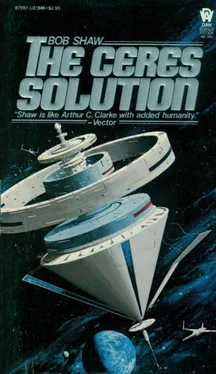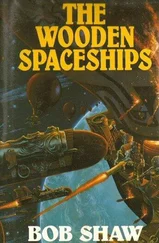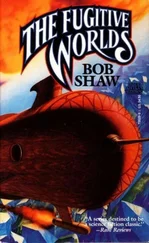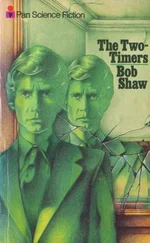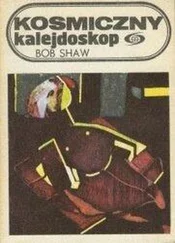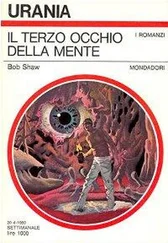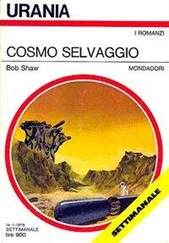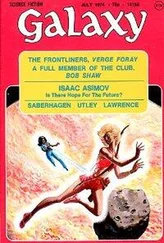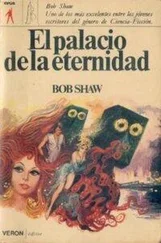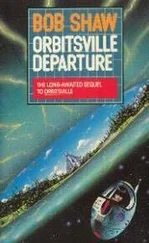That was the beginning of a public argument which eventually involved Hargate with another policeman, two sergeants and several plain-clothes officers of indeterminate rank, and which got him no further than a cramped office adjoining the entrance hall. As his frustration increased he began to feel flickers of pain in his chest, but he prolonged the scene—capitalising on the reluctance of the others to crack down hard on a cripple—until an entirely new symptom of his illness made itself apparent. At first his perceived world of giants simply appeared more crowded and confusing than usual, then came the jolting realisation that he was experiencing double vision. It was a classic symptom of MPN, one which Doctor Foerster had predicted, but its effect on Hargate was powerfully disconcerting. He was being attacked from within his own head. He lapsed into an abrupt silence while he groped in his pockets for the box of Enka-B tablets he had been neglecting to use.
One of the sergeants hunkered down in front of him. “Say, do you feel all right?”
“Why do you ask?” Hargate queried blandly, guessing that his features now had the additional asymmetry of a squint. “Don’t I look all right?”
It was when the sergeant turned away with a troubled expression, unexpectedly reminding Hargate of his mother when he had thrown verbal acid in her face, that he knew he wanted to go home. The notion of talking to Phil Barren, beguiling in its time, was ill-considered and pointless. What had he been hoping would come of it? An exclusive club for people who saw other people vanish in peculiar circumstances?
Hargate sat with his head down, trying to draw the calmness of pranayama from the air, only distantly aware that there were several newcomers in the small office. And when he found that one of them was Doctor Costick, presumably answering a summons from the police, he knew that his plans for the immediate future were complete.
He had done all that could be expected of him. He had tried the bold experiment of living a normal life in a frail travesty of a man’s body. He had even ventured into space, something of which only a microscopic fraction of the human race could boast, and through no fault of his own the dice had fallen badly, denying him everything that Aristotle had promised. There was nothing more that he or anybody else could do. It was now time for him to get rid of the pain and discomfort, the hopelessness and sheer indignity of being Denny Hargate.
“Good morning, doctor,” he said, smiling. “I don’t know what was wrong with my memory yesterday—I’ve just thought of the perfect place for me to stay in Carsewell.”
The fact that he was allowed to leave for the north that day was, Hargate realised, an indication of the vast overload being placed on all the Cape’s facilities by the emergency evacuation of the Aristotle colony. Throughout his entire stay the four operational shuttles had been living up to their generic name, the sound of their launchings creating an edgy vulcanic background to the lesser human activities on the ground. The Condominium was heavily populated by journalists of all kinds whose interest had been morbidly stimulated by the fact that the abandonment of Aristotle, the retreat from Lagrange, was probably the last big story concerning space flight. Hargate only escaped predatory reporters by virtue of not matching their preconceptions about how an astronaut ought to look.
His journey to the north took almost two days, a succession of starts and stops in transporter modules which clung for a while to the traction cables of huge nuclear prime movers and released their hold when a change of direction was needed. The gradual deterioration of the weather was appropriate to Hargate’s mood, and he was almost gratified by his first sight of snow, grey-white tatters which littered the passing landscapes like discarded newspapers. By the time he reached Carsewell the snow covering was complete and the coldness of the early morning air shocked him with each invasion of his lungs. He could imagine their tissue already beginning to wither, to succumb, path-finding for the rest of his body.
The other passengers who had descended from the same module quickly dispersed, leaving Hargate alone on the platform with the single large case which held all his belongings. Force of habit caused him to ponder for a moment on how to get the case to the baggage lockers unaided, then he remembered there was no need. He was abdicating from such responsibilities. Feeling oddly guilty, he engaged the wheelchair’s drive and rolled away towards the station’s exit, abandoning the case to its shabby isolation.
Carsewell was in the middle of the slight lull that always followed the morning rush, but he had difficulty in hiring a taxi. Several drivers, deciding that his chair would cause more inconvenience than the fare was worth, ignored his signals, and more than ten minutes elapsed before he was picked up. By that time the cold had penetrated his coat and the rug that covered his legs. The paralysis and debility affecting most of his body precluded shivering, the natural defence against low temperatures, with the result that he quickly began to feel numb.
“Where to?” the taxi driver said as the vehicle pulled away from Warren Station with some sputtering from its ageing electric motor.
It occurred to Hargate that his batteries would be unable to cope with the rising ground on the direct route to Cotter’s Edge, that he would need to approach it from the eastern side. “Do you know the Reigh place?”
“I only work on addresses, friend. You tell me the address and I’ll get you there.”
“Just west of Greenways—I’ll direct you,” Hargate said mildly. Under normal circumstances the other man’s brusqueness would have inspired a vigorously unpleasant retort, but that too was something for which there was no longer any need. There was no point in fighting battles after the war itself had been lost. He stared quietly and abstractedly at familiar scenery until the taxi had neared the crest of the low hills which bounded the city and was travelling along the perimeter of the Reigh farm.
The driver looked puzzled but refrained from comment when Hargate got out at a cattle gate from which the farm buildings themselves could not even be seen. Hargate felt a playful urge to increase the man’s bafflement by handing him all the money he had left as a tip, then decided it could excite suspicion and perhaps lead to interference with his plans. He gave a reasonable tip, watched the yellow vehicle disappear into the bright snowscape, then turned his thoughts to the considerable task of reaching the secret place in a conveyance which had not been designed for cross-country work.
Luckily, the snow covering had been pared thin by the wind and did not create too much drag once he had passed through the gate. He set off on a descending diagonal course towards the leafless maples which were like venous systems etched on horizontal swathes of brilliance formed by the pastures, folds of ground and distant hills. The sky was a sentient blue lens and it seemed impossible that he could reach his destination without being seen, but within five minutes he was safely among the trees and his motor was whining in complaint as the chair balked at their root systems. He used what remained of his strength to turn the wheels, careless of the thorny undergrowths which tore at his knuckles, and—magical suddenness—he was there. The secret place was all around him.
It was almost twenty-one years since Hargate had visited the hidden clearing, and he had never seen it before in winter, but the feel of the place was the same, its welcome was the same. There, exactly as he remembered it, was the limestone shelf which formed a natural armchair, cushioned now with a white meniscus of snow. There was the spring, rimmed with ice petals, and even the overturned stump was more-or-less intact.
Читать дальше
